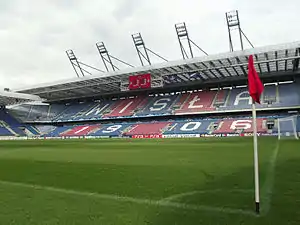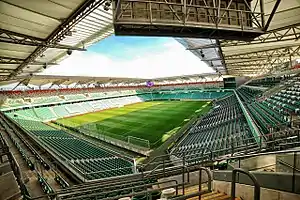Poland national football team
The Poland national football team (Polish: Reprezentacja Polski w piłce nożnej) has represented Poland in men's international football competitions since their first match in 1921. The team is controlled by the Polish Football Association, the governing body for football in Poland.
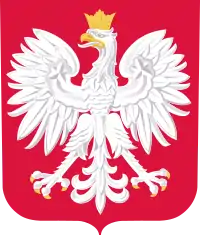 | |||
| Nickname(s) | Biało-czerwoni (The White and Reds) Orły (The Eagles) | ||
|---|---|---|---|
| Association | Polish Football Association (PZPN) | ||
| Confederation | UEFA (Europe) | ||
| Head coach | Paulo Sousa | ||
| Captain | Robert Lewandowski | ||
| Most caps | Robert Lewandowski (116) | ||
| Top scorer | Robert Lewandowski (63) | ||
| Home stadium | Stadion Narodowy Stadion Śląski | ||
| FIFA code | POL | ||
| |||
| FIFA ranking | |||
| Current | 19 | ||
| Highest | 5 (August 2017) | ||
| Lowest | 78 (November 2013) | ||
| First international | |||
(Budapest, Hungary; 18 December 1921) | |||
| Biggest win | |||
(Kielce, Poland; 1 April 2009) | |||
| Biggest defeat | |||
(Copenhagen, Denmark; 26 June 1948) | |||
| World Cup | |||
| Appearances | 8 (first in 1938) | ||
| Best result | Third place (1974, 1982) | ||
| European Championship | |||
| Appearances | 3 (first in 2008) | ||
| Best result | Quarter-finals (2016) | ||
| Medal record | ||
|---|---|---|
| Men's football | ||
| Olympic Games | ||
| 1972 Munich | Team | |
| 1976 Montreal | Team | |
| 1992 Barcelona | Team | |
Poland has competed at eight FIFA World Cups with their first appearance being in 1938 where they were eliminated by Brazil. The country's best result is a bronze medal which Poland won in 1974 and 1982, with this era being regarded as the golden era of Polish international football. At the UEFA European Championship, Poland's best result was a quarter-finals appearance at the 2016 tournament before losing to Portugal. Overall they have competed in three European Championships with their debut being in 2008. They were co-hosts of the 2012 edition, along with Ukraine. Overall, Poland's best ever result in international football tournaments was the gold medal won at the 1972 Munich Olympics, along with winning the silver medal on two occasions; at the 1976 Montreal Olympics and at the 1992 Barcelona Olympics.
History
Before independence
Poland, during 19th and early 20th century, was divided into three parts, the Russian part was once named Congress Poland (1815-1867) / 1915 and later Poland was a short lived kingdom named as the Kingdom of Poland (1917-1918); while Germany and Austria brought Poland to more direct controls. Thus, Poland was not an independent country back then as it was torn under the rule of three empires, German Empire, Austria–Hungary and Russian Empire. Poland regained independence in 1918 after more than a century not being independent. Harsh oppression from both parts, however, did not prevent football from reaching Poland. Started in the late 19th century with the rising popularity of the new sport, the first decades of Polish football are therefore connected with the history of Football in Austria and the Austrian Football Association, which was founded in 1904.
The first Polish football clubs were Lechia Lwów (1903), Czarni Lwów (1903), Pogoń Lwów (1904), KS Cracovia (1906) and Wisła Kraków (1906). The Polish national federation, called the Polish Football Union (Polski Związek Piłki Nożnej, PZPN), was founded on 20 December 1919, in Kraków when 31 delegates elected Edward Cetnarowski as the first president. The PZPN joined FIFA in 1923 and UEFA in 1955.
In a similar fashion to other European states, football appeared in Poland in the late 19th century. In 1888 Prof. Henryk Jordan, a court physician of the Habsburgs and the pioneer of sports in Poland, opened a sports park in Kraków's Błonia, a large open space surrounding the demolished city walls of that town. The park, along with the Sokół society founded in 1867, became the main centres to promote sports and healthy living in Poland. It was Jordan who began promoting football as a healthy sport in the open air; some sources also credit him with bringing the first football to Poland from his travels to Brunswick in 1890.[2] Other sources[3] mention Dr. Edmund Cenar as the one to bring the first ball and the one to translate The Cambridge Rules and parts of the International Football Association Board regulations to Polish language.
On 14 July 1894 during the Second Sokół Jamboree in Lwów at the General National Exhibition a short football match was played between the Sokół members of Lwów and those from Kraków. It lasted only six minutes and was seen as a curiosity rather than a potentially popular sport. Nevertheless, it was the first recorded football match in Polish history.[lower-alpha 1] It was won by the Lwów team after Włodzimierz Chomicki scored the only goal - the first known goal in Polish history.
This match precipitated the popularity of the new sport in Poland. Initially the rules and regulations were very simplified, with the size of the field and the ball varying greatly. Despite being discouraged by many educational societies and the state authorities, the new sport gained extreme popularity among pupils of various gymnasiums in Galicia. The first football teams were formed and in 1903–1904, four Lwów-based gymnasiums formed their own sport clubs: the IV Gymnasium for Boys formed a club later renamed to Pogoń Lwów, while the pupils of the I and II State Schools formed the Sława Lwów club, later renamed to Czarni Lwów. In the same season the Lechia Lwów was also formed. It is uncertain which of the clubs was created first as they were initially poorly organized; however, the Czarni Lwów are usually credited as being the first Polish professional football team. The following year, the popularity of the sport spread to nearby Rzeszów where Resovia Rzeszów was formed, while in the German-held part of Poland, the 1. FC Katowice and Warta Poznań were formed.
On 6 June 1906 a representation of Lwów youth came to Kraków for a repeat match, this time composed of two already organized teams, the Czarni and the team of the IV Gymnasium. Kraków's representation was badly beaten in both meetings (4-0 and 2-0 respectively). The same summer the Buffalo Bill Wild West Show set up camp at Kraków's Błonia, right outside of the traditional playground area and Jordan's garden. On 5 August 1906 the team of the Kraków-based Jan Sobieski Gymnasium played a match against the British and American members of Buffalo Bill's troupe, winning 1–0. The only goal scored by Stanisław Szeligowski was also the first goal scored by a Polish team in an international meeting. The success led to the popularisation of football in Kraków and to creation of the first Kraków-based professional football team, KS Cracovia - initially composed primarily of students of the Jan Sobieski Gymnasium.[2] By the autumn of that year there were already 16 teams in Kraków, including Wisła Kraków (It is said that actually Wisła Kraków was the first professional football team and not Cracovia). In 1911, a Kraków-based Union of Polish Football for Galicia was formed and entered the Austrian Football Association. The union inspired the creation of a number of teams.
After the outbreak of World War I, most of the Galician football players, many of them members of either Strzelec or Sokół, joined Piłsudski's Polish Legions. The unit, fighting alongside the Austro-Hungarian Army, fought mostly in various parts of Russian-held Poland, which led to popularisation of the new sport in other parts of Poland. Eventually, Poland regained independence in 1918 and football of Poland also officially began.
1919–1939: Early years
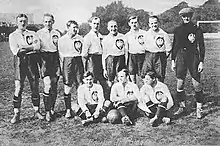
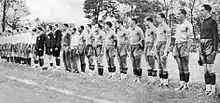
The first football federation was established on 25 June 1911 in Lwów as the Polish Football Union (Związek Polski Piłki Nożnej). After I World War members of PFU established on 20 December 1919 in Warsaw the Polish Football Federation (Polski Związek Piłki Nożnej). Two years later, they appointed Hungarian-born Jesza Poszony as the first coach of Polish national team. Poland would play its first official international match on 18 December 1921 in Budapest, where the side lost to Hungary 1–0. Their first international win would come on 28 May 1922 where they took on Sweden in Stockholm and beat them 2–1. Józef Klotz scored the first-ever goal for the national football team in that game.[4][5][6][7][8] Poland qualified for their first ever World Cup in 1937 when they beat Yugoslavia 4–0 and lost 1–0 in the two qualifying matches and ensured their place in the 1938 World Cup in France.
During their debut in the World Cup, Poland was set to play Brazil, by then had not been a world football power. The Polish team – which had never before participated on such a level – was expected to lose the game against the South Americans. Thus, the defeat was not a sensation. However, all fans were surprised at the style with which the Poles played their lone game of the tournament. The White and Red got to the extra time, only then losing 5–6. Ernest Wilimowski, who played for Ruch Chorzów at the time, scored four of Poland's five goals, which to date is one of the most impressive individual performances in the history of the World Cup.
Poland played what would be their last international match before the outbreak of World War II against Hungary, the runners-up in the 1938 World Cup. The match stands out as an achievement as Poland defeated the strongly favored Hungarian side 4–2.
1939-1945: Ban on football under the occupation
When the Wehrmacht invaded Poland in September 1939, all Polish institutions and associations were dissolved, including the Polish Football Association PZPN. The German occupying forces forbade Poles to organise football matches. Consequently, there was no national team.[9]
Nine former national players were murdered by the German occupying forces. Three of them were killed in Auschwitz: Marian Einbacher, Adam Knioła (both Warta Poznań) and Antoni Łyko (Wisła Kraków). Stefan Fryc (Cracovia) and Bronisław Makowski (Wisła Kraków), who were both active in the resistance, were killed in mass shootings. Four Jewish players were murdered in Jewish ghettos: Józef Klotz, Zygmunt Krumholz (both Jutrzenka Kraków), Leon Sperling (Cracovia) and Zygmunt Steuermann (Hasmonea Lwów), brother of actress and Hollywood screenwriter Salka Viertel.[10]
.jpg.webp)
1946–1974: Beginnings of the rise
On 11 June 1946, following the aftermath of World War II, Poland played their first international friendly match, against Norway in Oslo, a 3–1 defeat. The biggest success in the early years after the war was the victory against one of Europe's best at the time, Czechoslovakia. Poland defeated their southern neighbors 3–1.
Poland suffered the worst defeat in the team's history on 26 April 1948 with a 0–8 loss to the Danish side. Poland would later erase that memory as they posted their second highest ever victory in Szczecin when they took down Norway 9–0 on 4 September 1963. The game marked the debut for Włodzimierz Lubański. He scored one of the goals in the game. Lubański became the all-time top scorer for Poland while playing from 1963 to 1980 scoring 48 goals in 75 appearances. This victory was surpassed on 1 April 2009 in Kielce when Poland defeated San Marino 10–0.
On 1 December 1970, Polish football history would change forever all due to one man. Kazimierz Górski was named head coach of the national team. His success with the team was evident from the start with a gold medal at the 1972 Summer Olympics. Górski would later lead the team to another medal at the 1976 Olympics where they captured silver. However, nothing matched the two bronze medals at the 1974 and 1982 World Cups — thus became part of Polish football history known to be the first Polish Golden generation.
1974–1986: "Golden Era"
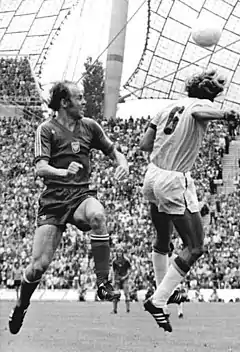
Poland was not considered a major power on the international football scene before 1974. In qualifying for the 1974 World Cup in Germany, they surprised observers by eliminating England, quarter-finalists in 1970 and Champions in 1966. The core of the team had already won a gold medal in the Munich Olympics in 1972.

In their opening match of the 1974 World Cup, Poland met Argentina, a team that was appearing in their 6th World Cup. Within eight minutes Poland were up 2–0, Grzegorz Lato opened the scoring in the seventh minute and just a minute later Andrzej Szarmach doubled the lead. In the 60th minute, Argentina cut the lead in half when Ramon Heredia scored. Two minutes later, however, Lato scored his second, which turned out to be the winning goal as Carlos Babington gave Argentina their second in the 66th. The match finished 3–2 for Poland.
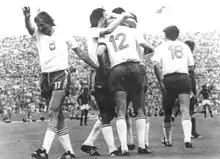
Poland thrashed Haiti 7–0 in their second game. The goals included a hat-trick from Szarmach and two from Lato. In their final match of the first stage, Poland met Italy, who finished second at the previous World Cup in 1970. Poland were already through to the Second Round but needed at least a draw to win the group. At half-time, Poland was leading 2–0 on goals from Andrzej Szarmach and Kazimierz Deyna. It was not until the 86th minute that Italy managed a consolation goal through Fabio Capello. This gave Poland their third consecutive win, which led them to win the group. In the second round, Poland first won 1–0 against a Swedish side, which had not conceded any goals in their first three matches. Lato scored the only goal of the game. Next was Yugoslavia, who had drawn with Brazil and Scotland and won 9–0 against Zaire in the first round. Poland was awarded a penalty in the 24th minute and took the lead when Deyna converted. Stanislav Karasi tied it up for Yugoslavia in the 43rd. Lato won it for Poland again when he scored in the 62nd, making the final score 2–1 in Poland's favour.
On 3 July 1974 came the game that could have sent Poland into the 1974 World Cup Final. They played against the eventual champions West Germany. It had rained all day long, the field was entirely flooded. Poland wanted the game postponed but the Austrian referee would not agree. The game went ahead. Poland needed a win to be in the final, a draw was enough for the Germans. But in the miserably wet conditions, Poland's speed was of no use since the ball would not roll as it does on a dry field. Gerd Müller scored the winning goal in the 76th minute for Germany. The whole country was crushed. Poland would end the amazing run with a 1–0 victory over Brazil in the third-place game. Lato scored the winning goal his seventh of the tournament crowning him the top scorer of the World Cup.
In qualifying, Poland denied Portugal their second World Cup appearance when in 1966 they had captured third place. Poland opened the World Cup against their rivals from four years prior and the current Champions, West Germany. This time the match ended in a 0–0 draw.
Grzegorz Lato continued his scoring ways with the only goal in the 1–0 win over African side Tunisia in the second game. In the final first-round match Poland met Mexico. Zbigniew Boniek playing in his first World Cup opened the scoring in the 43rd minute. The Mexicans drew level through Víctor Rangel in the 52nd minute, but four minutes later Kazimierz Deyna put Poland ahead once again. Then Boniek scored his second in the 84th to secure the 3–1 win.
In the second round, Poland met three South American teams. In 1974, Poland had played and won against both Argentina and Brazil, both teams would get their revenge this time around. First, Argentina beat the Poles 2–0 with two goals from tournament top scorer Mario Kempes. Poland then defeated Peru 1–0 with a goal from Andrzej Szarmach. In what was Poland's last match of this World Cup, Brazil opened the scoring in the 12th minute on a goal from Nelinho. Even though Lato equalized one minute before half-time, it was not to be for Poland: two goals from Roberto in the 57th and 62nd minutes wrapped up the 3–1 win for Brazil.
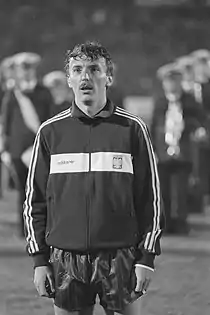
On 29 November 1980, a dispute between players and technical staff began at a hotel in Warsaw, ending in the Okęcie Airport. Following the incident, several players of the Poland national team were banned from international duty, also leading to the resignation of Ryszard Kulesza as head coach of the team.[11] At the 1982 FIFA World Cup, Poland were drawn in a group with Italy, Cameroon and Peru.[12] The first two games were consecutive 0–0 draws with Italy and Cameroon, but the final group game of the first round ended in a 5–1 win for Poland, meaning they would advance to the second round as group winners.[13][14][15]
In the first game of the second round, Poland beat Belgium 3–0; with a hat-trick from Boniek securing him a classic performance in the match, but the player would also receive a yellow card in the following match.[16][17] Nevertheless, Poland advanced as group winners to the knockout stage.[12] However, Poland would eventually be stopped in the semi-finals, losing 0–2 to Italy and ending the dream of playing at the World Cup final once again; but also securing a place in the third place play-off.[18] In the third place play-off, Poland beat France 3–2, with the game also being regarded as "the end of the golden era of Polish football".[19]
In 1986 FIFA World Cup qualifying, Poland finished top of the qualifying group; with 3 wins, 2 draws and 1 defeat.[20] Poland's biggest win of the qualifying phase was a 4–1 win over Greece, meanwhile Poland's biggest defeat was a 0–2 defeat to Belgium.[21][22]
At the 1986 FIFA World Cup, Poland were drawn into a group with England, Morocco and Portugal.[23] The first match was a 0–0 draw, and in the second match, beat Portugal 1–0.[24][25] In the final group game, they lost 0–3 to England, but Poland still advanced into the knockout stage, as a result of Morocco winning 3–1 over Portugal.[26][27] In the round of sixteen, Poland were eliminated after suffering a 4–0 defeat to Brazil.[28]
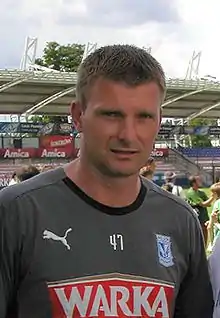
1986–2001: Decline
After the "Golden Era" from the 1970s and 1980s, Poland suffered a severe drought in international football; they didn't qualify for three consecutive editions of the FIFA World Cup, failing to qualify in 1990, 1994 and 1998.
In 1990 World Cup qualifying, Poland finished 3rd in the qualifying group, behind Sweden and England, on 5 points with two wins, one draw and three defeats.[29] They began qualifying for the 1990 edition with a 1–0 win over Albania, before defeats to Sweden (2–1) and England (3–0).[30][31][32] Poland then drew 0–0 with England, lost to Sweden 0–2 and beat Albania 2–1 in their final game, but were 4 points behind England; thus failing to qualify.[33][34][35]
In 1994 World Cup qualifying, Poland finished 4th in the qualifying group, behind Norway, the Netherlands and England.[36] Poland began qualifying with 1–0 win over Turkey; followed by a 2–2 draw with the Netherlands, a 1–0 win over San Marino and a 3–0 win in the reverse fixture.[37][38][39][40] Afterwards, Poland drew 1–1 with England, before a 0–3 defeat in the reverse fixture.[41][42] Afterwards, Poland would then go on to suffer consecutive defeats, losing 1–0 and 3–0 to Norway, followed by a 2–1 defeat to Turkey and a 1–3 defeat to the Netherlands in the final fixture.[43][44][45][46]
In Euro 1996 qualifying, Poland drew a qualifying group with Romania, France, Slovakia, Israel and Azerbaijan.[47] Poland lost 2–1 to Israel in the first game, and would later record a 1–0 win over Azerbaijan and a 0–0 draw with France.[48][49][50] Later, Poland lost 2–1 to Romania, beat Israel 4–3 and Slovakia 5–0, before consecutive draws with France (1–1) and Romania (0–0).[51][52][53][54] Poland lost 4–1 to Slovakia in the penultimate qualifying game, and drew 0–0 with Azerbaijan in the final group game.[55][56]
In 1998 World Cup qualifying, Poland finished 3rd behind England and Italy.[57] They began qualifying with a 2–1 loss to England before a win over Moldova (2–1) and a 0–0 draw with Italy.[58][59][60] Afterwards, they suffered successive defeats to Italy (3–0) and England (0–2).[61][62] They won the next two games; 4–1 over Georgia and 3–0 over Moldova, with Andrzej Juskowiak scoring a hat-trick against the latter.[63][64] The final game was against Georgia, with Poland losing 0–3.[65]
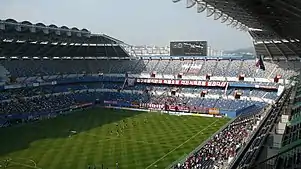
During the EURO 2000 Qualification. Poland was in a group with England, Sweden, Bulgaria and Luxemburg. Despite Poland being an Underdog in the group. They surprised by finishing above higher favourited Bulgarians and winning 2 games against them. Poland was third and was tied in points with England but failed to Qualify by Goal Differences.
2001–2006: Rebuild
Poland qualifying for the 2002 World Cup was significant, as it was Poland's first appearance at the World Cup finals since 1986.[66] Poland's biggest win overall in the qualifying phase was a 4–0 win over Armenia, while Poland's biggest defeat was a 1–4 defeat to Belarus.[67][68]
The Polish drew a group featuring South Korea, the United States and Portugal.[69] The first match was played with South Korea on 4 June; with Poland losing 2–0.[70] The second game was with Portugal on 10 June; which Poland lost 4–0.[71] Poland then played the United States in the final group game on 14 June; winning 3–1 with goals from Olisadebe, Kryszałowicz and Żewłakow.[72] Despite the win, Poland finished last in the group, with a goal difference of –4 and 3 points.[4]

Poland's qualifying for the 2006 FIFA World Cup was overall successful; as they won eight and lost two, without a single draw.[73] They finished behind England in the qualifying group; but as a result of being the second best second-placed team in the play-offs, they qualified automatically for the finals in Germany.[73] The biggest win of the qualifying phase for Poland was an 8–0 victory over Azerbaijan, in which Tomasz Frankowski scored a hat-trick.[74][75] The biggest defeat of the qualifying phase for Poland were two defeats against England, losing both home and away games by a scoreline of 1–2.[76][77]
At the 2006 World Cup, Poland drew Germany, Ecuador and Costa Rica in Group A.[78] Despite high hopes from the Polish press, media and fans, Poland's campaign at the World Cup was seen as an underachievement; as Poland lost two and won one game, finishing third in the group.[79] Poland's first match was a 2–0 defeat to Ecuador,[80] followed by a 1–0 defeat to Germany, with Oliver Neuville scoring a stoppage time winning goal;[81] with the defeat to Germany, and following Ecuador's 3–0 win over Costa Rica, officially ending Poland's chances of advancing further than the group.[82] The third and final group game saw Poland defeat Costa Rica 2–1; with Bartosz Bosacki getting on the scoresheet twice.[83][84]
2008: Debut at the Euros
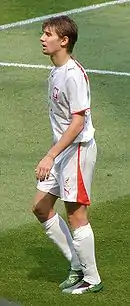
In Euro 2008 qualifying, Poland were drawn into a group with Portugal, Serbia, Finland, Belgium, Kazakhstan, Armenia and Azerbaijan.[85] Poland's campaign began in uncomfortable fashion; suffering a 1–3 defeat to Finland on 2 September 2006 and then drawing 1–1 with Serbia on 6 September.[86][87] In the third match, on 7 October, Poland won 1–0 over Kazakhstan, with Euzebiusz Smolarek scoring the goal.[88] On 11 October, Poland beat Portugal 2–1 with Smolarek scoring the two goals.[89] On 15 November, they beat Belgium 1–0.[90] On 24 March 2007, Poland beat Azerbaijan 5–0, and on 28 March beat Armenia 1–0.[91][92] On 2 June, they beat Azerbaijan 3–1 with Smolarek and Krzynówek (2) scoring.[93] On 6 June, Poland lost 1–0 to Armenia, on 8 September drew 2–2 with Portugal, and on 12 September drew 0–0 with Finland.[94][95][96] On 13 October, Poland beat Kazakhstan 3–1 with a hat-trick from Smolarek.[97] On 17 November, they beat Belgium 2–0 with two goals from Smolarek, and on 21 November drew 2–2 with Serbia in the final qualifying game; thus qualifying for the tournament as the 1st place team in the qualifying group following Portugal's 0–0 draw with Finland, Poland's first ever Euro appearance.[98][99][100]
At UEFA Euro 2008, they were drawn in Group B; with Germany, Austria and Croatia.[101] The opening match was against Germany on 8 June at the Hypo-Arena in Klagenfurt, a match that Poland lost 2–0 with two goals from Lukas Podolski.[102] In the second game, Poland drew 1–1 with Austria; taking the lead through Brazil-born Roger Guerreiro, before conceding in the third minute of stoppage time following a controversial penalty.[103][104] The final group game was against Croatia, which Poland lost 1–0, finishing bottom of the group.[105]
2010: Disaster in World Cup qualifying
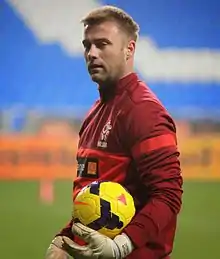
In 2010 FIFA World Cup qualifying, Poland were drawn in a group with Slovakia, Slovenia, the Czech Republic, Northern Ireland and San Marino, and this has been Poland's worst qualifying campaign to date. Poland finished 5th in the group; just above San Marino, with 11 points.[106] Poland began the campaign with a 1–1 draw against Slovenia on 6 September 2008.[107] On 10 October, Poland beat San Marino 2–0.[108] On 11 October, they won 2–1 against the Czech Republic.[109] After these two wins, Poland lost consecutive matches against Slovakia (15 October, losing 1–2) and Northern Ireland (28 March 2009, losing 2–3).[110][111] After these defeats, Poland recorded their biggest ever win, winning 10–0 against San Marino in which six different players scored, with Euzebiusz Smolarek scoring four goals, on 1 April 2009.[112][113] On 5 September, Poland drew 1–1 with Northern Ireland and on 9 September, lost 3–0 to Slovenia.[114][115] On 10 October, Poland lost 2–0 to the Czech Republic and on 14 October, lost 1–0 to Slovakia.[116][117]
2012: Host of the Euros
On 18 April 2007, in Cardiff, Poland and Ukraine were selected to host UEFA Euro 2012 by the UEFA Executive Committee. The bid defeated other bids made, including one from Italy and joint bids by Croatia and Hungary and Greece and Turkey; thus becoming the third successful joint-bid made to host the UEFA European Championship, after the Netherlands and Belgium in 2000, and Austria and Switzerland in 2008.
Poland were drawn into Group A; with Greece, Russia and the Czech Republic.[118] On 8 June, the opening match played between Poland and Greece at the Stadion Narodowy in Warsaw, ended 1–1, with Poland taking the lead in the 17th minute through Robert Lewandowski before Greece equalized in the second half through Dimitris Salpingidis in the 51st minute, and in the game, both teams went down to 10 men.[119][120] Poland's next game was on 12 June, again played at the Stadion Narodowy in Warsaw, with the game against Russia finishing 1–1, with Russia taking the lead through Alan Dzagoev in the 37th minute before Poland equalized through Błaszczykowski in the 57th minute.[121][122] Poland's final game was against the Czech Republic, played on 16 June, at the Stadion Miejski, in Wrocław, where Poland lost 1–0 following a goal from Petr Jiráček.[123][124] Poland finished bottom of the group, with just two points, prompted coach Franciszek Smuda to resign following the humiliating elimination.[118]
2014: World Cup qualifying
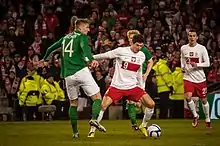
Poland was drawn in Group H of 2014 FIFA World Cup qualifying; with England, Ukraine, Montenegro, Moldova and San Marino.[125]
On 7 September, Poland's first qualifying match ended in a 2–2 draw with Montenegro, with goals from Błaszczykowski and Mierzejewski.[126] On 11 September, they beat Moldova 2–0 with goals from Błaszczykowski and Wawrzyniak.[127] On 17 October, Poland drew 1–1 with England, with Glik scoring the equalizing goal.[128] On 22 March 2013, Poland lost 3–1 to Ukraine, conceding two goals in the first seven minutes alone, with Piszczek scoring Poland's only goal.[129] On 26 March, Poland beat San Marino 5–0, with a brace from Lewandowski, and goals from Piszczek, Teodorczyk and Kosecki.[130] On 6 September, Poland drew 1–1 with Montenegro; with Lewandowski scoring the equalizing goal only five minutes after Poland initially conceded.[131] On 10 September, they beat San Marino 5–1, with a brace from Zieliński, and goals from Błaszczykowski, Sobota and Mierzejewski.[132] However, Poland lost the last two games against Ukraine and England; losing 1–0 and 2–0, respectively.[133][134][135]
2016–2018: "New Era" 2016 Euro Quarterfinal and 2018 World Cup qualifying
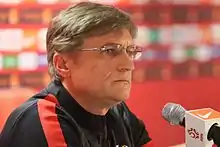
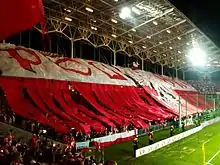
In UEFA Euro 2016 qualifying, Poland were drawn in Group D; with Germany, Scotland, the Republic of Ireland, Georgia and Gibraltar.[136]
On 7 September 2014, Poland beat Gibraltar 7–0, with Robert Lewandowski scoring four goals, Kamil Grosicki scoring two goals and Łukasz Szukała scoring one goal.[137][138][139] On 11 October, Poland beat Germany 2–0, with Germany having won the 2014 FIFA World Cup less than three months prior, with goals from Arkadiusz Milik and Sebastian Mila.[140] On 14 October, Poland drew 2–2 with Scotland, with goals from Krzysztof Mączyński and Milik not being enough to secure the three points.[141] On 14 November, they beat Georgia 4–0, with goals from Kamil Glik, Grzegorz Krychowiak, Mila and Milik.[142] On 29 March 2015, they drew 1–1 with the Republic of Ireland, with Sławomir Peszko; but conceded a goal from Shane Long in stoppage time.[143] On 13 June, they beat Georgia 4–0; with a goal from Milik and a hat-trick from Lewandowski.[144] On 7 September, they beat Gibraltar 8–1; with Grosicki, Lewandowski and Milik all scoring twice, and Jakub Błaszczykowski and Bartosz Kapustka.[145] On 8 October, they drew 2–2 with Scotland, with Lewandowski scoring a brace.[146] On 11 October, they beat the Republic of Ireland 2–1 with goals from Krychowiak and Lewandowski, securing automatic qualification for the Euros.[147]
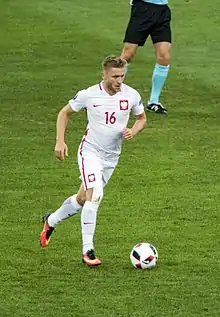
At the UEFA Euro 2016 finals, Poland were drawn in Group C; with Germany, Northern Ireland and Ukraine.[148]
Poland's first match was with Northern Ireland, on 12 June at the Stade de Nice in Nice; a game they won 1–0 with a goal from Arkadiusz Milik in the 51st minute.[149] The next match was with Germany at the Stade de France in Saint-Denis on 16 June; with the finishing 0–0.[150] Poland's final group game was with Ukraine on 21 June, at the Stade Vélodrome in Marseille, a game they won 1–0 with a goal from Jakub Błaszczykowski.[151] In the round of sixteen, Poland were drawn to play Switzerland on 25 June at the Stade Geoffroy-Guichard in Saint-Étienne. Poland took the lead through a goal from Błaszczykowski, but conceded a bicycle kick from Xherdan Shaqiri in the 82nd minute, finishing the game 1–1 in regular time. After even extra-time could not break the tie; Poland beat Switzerland in a penalty shootout, winning 5–4 on penalties.[152][153] On 30 June, at the Stade Vélodrome in Marseille played with Portugal in the quarter-finals of the tournament; a game in which Poland took the lead in the 2nd minute through a goal from Robert Lewandowski before conceding a goal from Renato Sanches in the 33nd minute. The match was 1–1 even after regular time and extra-time ended; thus taking the game to penalties. Poland lost the penalty shootout, losing 5–3 with Błaszczykowski having the crucial penalty saved.[154]
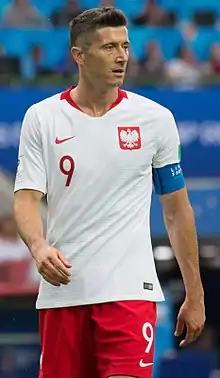
In 2018 FIFA World Cup qualifying, Poland were drawn in Group E; with Denmark, Montenegro, Romania, Armenia and Kazakhstan.[156]
The opening match for Poland was against Kazakhstan on 4 September 2016, which Poland drew 2–2, taking a 2–0 lead through goals from Bartosz Kapustka and Robert Lewandowski, but they conceded two goals from Sergei Khizhnichenko in the second half.[157] On 8 October, Poland beat Denmark 3–2 with Lewandowski scoring a hat-trick.[158] Three days later, on 11 October, they beat Armenia 2–1, with goals from Lewandowski and an own goal from Hrayr Mkoyan.[159] On 11 November, Poland beat Romania 3–0 with Kamil Grosicki and Lewandowski (2) scoring the goals.[160] On 26 March 2017, Poland beat Montenegro 2–1 with Lewandowski and Łukasz Piszczek scoring the goals.[161] On 10 June, Poland beat Romania 3–1 with a hat-trick from Lewandowski.[162] However, on 1 September, they suffered a 4–0 defeat to Denmark, their first loss of their qualifying campaign.[163] Three days later, they beat Kazakhstan 3–0 with goals from Arkadiusz Milik, Kamil Glik and Lewandowski.[164] On 5 October, they trashed Armenia 6–1, with goals from Grosicki, Jakub Błaszczykowski, Rafał Wolski and a hat-trick from Lewandowski, who became Poland's record goalscorer in the match.[165] Three days later, on 8 October, Poland officially qualified for the tournament with a 4–2 win over Montenegro; with goals from Krzysztof Mączyński, Grosicki, Lewandowski and an own goal from Filip Stojković.[166]
Lewandowski scored 16 goals during qualifying; breaking the European qualifying scoring record, as well as becoming the all-time top goalscorer of Poland.[167]
2018: Catastrophe at the World Cup
Poland played at the 2018 FIFA World Cup, their first World Cup since 2006, in Group H; against Senegal, Colombia and Japan.[169] Despite the group being considered close, Poland were tipped as favorites to advance.[170][171][172] In May 2018, Poland named the preliminary 34-man squad, and on 4 June, they named the final 23-man squad.[173][174] The squad featured several notable players; such as elite striker Robert Lewandowski (playing at his first World Cup), VfL Wolfsburg's veteran midfielder Jakub Błaszczykowski, Monaco defender Kamil Glik (who suffered an injury two weeks prior to the start of the tournament), Napoli forward Arkadiusz Milik and Juventus goalkeeper Wojciech Szczęsny.[175]
However, despite all of this and despite being ranked 8th in the FIFA Ranking prior to the tournament,[176] Poland's tournament was disappointing overall; they lost to Senegal in the opening match, losing 1–2 on 19 June in Moscow.[177] Five days later, on 24 June, they lost to Colombia in Kazan, losing 0–3,[178] which mathematically ended their hopes of qualifying from the group and on 28 June, beat Japan 1–0 in their final group game in Volgograd.[179] Poland finished bottom of their group, and like their two previous performances in 2002 and 2006, got two losses and only won the last match.[180]
2018–2019 UEFA Nations League and UEFA Euro 2020 qualifying
The qualifying group stage draw was held on 2 December 2018 in Dublin, Republic of Ireland. The 55 teams were drawn into 10 groups: five groups of five teams (Groups A–E) and five groups of six teams (Groups F–J). Ranked at No. 10 in Pot 1, Poland was drawn into UEFA Euro 2020 qualifying Group G. Group G consists of six teams: Austria, Israel, Latvia, North Macedonia, Poland and Slovenia,[181] where they will play against each other home-and-away in a round-robin format.[182]
The top two teams will qualify directly for the finals. Unlike previous editions, the participants of the play-offs will not be decided based on results from the qualifying group stage, but instead based on their performance in the 2018–19 UEFA Nations League. In 2018, Poland was drawn into Group 3 in the 2018–19 UEFA Nations League A, along with Portugal and Italy. Poland, which had not gotten out from the shocking 2018 World Cup nightmare, was relegated to League B with two home defeats and two away draws, only to be allowed to remain on League A following UEFA rule changes.
Despite this poor performance in the Nations League however, Poland opened their UEFA Euro 2020 qualifying by a single-margin 1–0 win against Austria in Vienna thanked for Krzysztof Piątek.[183] Three days later, Poland followed up their suit by beating Latvia 2–0 at home.[184]
On Friday June 7, 2019, Poland defeated North Macedonia with an unimpressive 1–0 win by a lone goal from Piątek which made the team suffered criticism for its poor form in that win.[185] On June 10, 2019, Poland put its best performance up to date in the UEFA Euro 2020 qualification, overpowering Israel 4–0 in Warsaw three days later with goal from Krzysztof Piątek, Robert Lewandowski, Kamil Grosicki and Damian Kądzior.[186]
Poland continued its quest for UEFA Euro 2020 by a visiting game against minor Slovenia and was expected to grab total three points in Ljubljana due to Slovenia's unimpressive performance. Despite this, Poland's trip to Slovenia turned to be a complete nightmare, with the team suffered a humiliating 0–2 away defeat.[187] A following 0–0 home draw to Austria meant that Poland's top spot had been under bank with Slovenia approached very quickly.[188]
In October, Poland embattled two opponents, Latvia and North Macedonia, for its UEFA Euro 2020 quest. Poland managed a convincing 3–0 away win over minnows Latvia, eliminated the Latvians from the competition.[189] Surprisingly, Slovenia's shock away defeat to North Macedonia relieved pressure for Poland, with Slovenia fell from second to fourth place, gave the Poles an upper hand to qualify.[190] Eventually, Poland beat North Macedonia 2–0 at home,[191] and with Slovenia fell hurdle to the Austrians at Slovenian soil,[192] Poland qualified to the competition for the fourth consecutive participation history.
2020: UEFA Euro 2020 (played in 2021 due to COVID-19 pandemic)
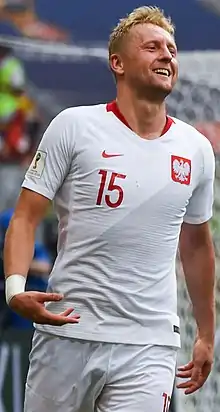
Poland will play in June 2021 in Bilbao's San Mamés and Dublin's Aviva Stadium.[193] The draw has put Poland into against two very strong and difficult opponents, the hosts Spain and Sweden, alongside the winner of Play-off Path B. The top two teams from each group will progress to the round of 16, along with the four best runners-up chosen among the third-placed teams.
2020–2021 UEFA Nations League and 2022 World Cup qualifying
Being allowed to remain in League A, Poland was drawn against Italy, Netherlands and Bosnia and Herzegovina. The performance of this tournament would be doubled as part of the upcoming 2022 FIFA World Cup qualification as playoff campaigns. Poland was also seeking its first win and a possible best finish in order to obtain a possible playoff position in case they could not directly qualify for 2022 FIFA World Cup.
Poland started their League games without Lewandowski. In their first match, an away game against the Dutch, the Poles disappointed with a 0–1 loss.[194] Then, Poland had to make another away trip, this time against the tough Bosnian rival, which held Italy 1–1 away before and was better prepared with the arrival of Edin Džeko. However, Poland managed a comeback, from being a goal down, Kamil Glik and Kamil Grosicki turned the deficit to beat Bosnia 2–1, which was Poland's historic win in the Nations League.[195] In October, Poland hosted Italy and Bosnia at home, and the Poles obtained four points, a goalless draw with Italy before an important 3–0 win over Bosnia with Lewandowski scoring 2 and Karol Linetty scoring 1, temporarily occupying top spot of the group.[196][197] However, when matches resumed in November, Poland had to deal with more difficulties when they headed up against Italy away, and bowed down with a 0–2 defeat despite Italy had already been depleted by COVID-19 plague, thus Poland lost any chance to determine in their quest for the Final of the Nations League.[198] With very slim opportunity, Poland gave up and lost to the Netherlands 1–2 at home, ending in third place and will stay in the same league for the 2022–23 UEFA Nations League season.[199]
Competitive record
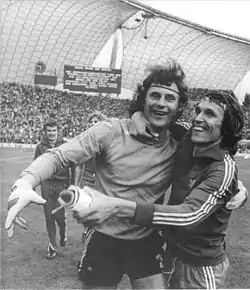
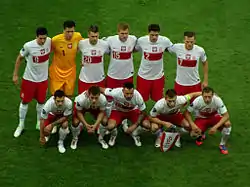
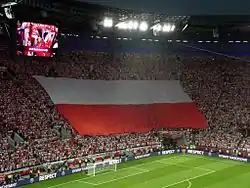
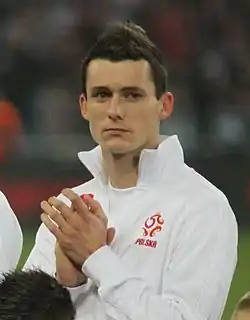
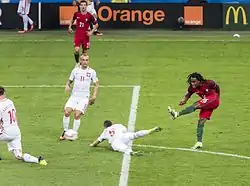
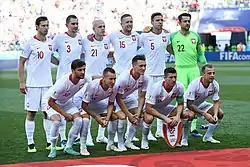
FIFA World Cup
| FIFA World Cup record | FIFA World Cup qualification record | ||||||||||||||
|---|---|---|---|---|---|---|---|---|---|---|---|---|---|---|---|
| Year | Round | Position | Pld | W | D* | L | GF | GA | Pld | W | D | L | GF | GA | |
| Did not enter | Declined participation | ||||||||||||||
| Did not qualify | 1 | 0 | 0 | 1 | 1 | 2 | |||||||||
| Round 1 | 11th | 1 | 0 | 0 | 1 | 5 | 6 | 2 | 1 | 0 | 1 | 4 | 1 | ||
| Did not enter | Declined participation | ||||||||||||||
| Withdrew | Withdrew | ||||||||||||||
| Did not qualify | 5 | 3 | 0 | 2 | 9 | 7 | |||||||||
| 2 | 0 | 1 | 1 | 2 | 3 | ||||||||||
| 6 | 2 | 2 | 2 | 11 | 10 | ||||||||||
| 6 | 4 | 0 | 2 | 19 | 8 | ||||||||||
| Third place | 3rd | 7 | 6 | 0 | 1 | 16 | 5 | 4 | 2 | 1 | 1 | 6 | 3 | ||
| Round 2 | 5th | 6 | 3 | 1 | 2 | 6 | 6 | 6 | 5 | 1 | 0 | 17 | 4 | ||
| Third place | 3rd | 7 | 3 | 3 | 1 | 11 | 5 | 4 | 4 | 0 | 0 | 12 | 2 | ||
| Round of 16 | 14th | 4 | 1 | 1 | 2 | 1 | 7 | 6 | 3 | 2 | 1 | 10 | 6 | ||
| Did not qualify | 6 | 2 | 1 | 3 | 4 | 8 | |||||||||
| 10 | 3 | 2 | 5 | 10 | 15 | ||||||||||
| 8 | 3 | 1 | 4 | 10 | 12 | ||||||||||
| Group stage | 25th | 3 | 1 | 0 | 2 | 3 | 7 | 10 | 6 | 3 | 1 | 21 | 11 | ||
| 21st | 3 | 1 | 0 | 2 | 2 | 4 | 10 | 8 | 0 | 2 | 27 | 9 | |||
| Did not qualify | 10 | 3 | 2 | 5 | 19 | 14 | |||||||||
| 10 | 3 | 4 | 3 | 18 | 12 | ||||||||||
| Group stage | 25th | 3 | 1 | 0 | 2 | 2 | 5 | 10 | 8 | 1 | 1 | 28 | 14 | ||
| To be determined | To be determined | ||||||||||||||
| Total | Third place | 8/21 | 34 | 16 | 5 | 13 | 46 | 45 | 116 | 60 | 21 | 35 | 228 | 141 | |
Olympic Games
| Host nation(s) – Year | Result | Pld | W | D* | L | GF | GA |
|---|---|---|---|---|---|---|---|
| no Olympic football tournament | |||||||
| Did not enter | |||||||
| Round 1 | 1 | 0 | 0 | 1 | 0 | 5 | |
| Did not qualify | |||||||
| no Olympic football tournament | |||||||
| Fourth place | 4 | 2 | 0 | 2 | 11 | 10 | |
| Did not qualify | |||||||
| Round 1 | 2 | 1 | 0 | 1 | 2 | 3 | |
| Did not qualify | |||||||
| Group stage | 3 | 1 | 0 | 2 | 7 | 5 | |
| Did not qualify | |||||||
| Gold medalists | 7 | 6 | 1 | 0 | 21 | 5 | |
| Silver medalists | 5 | 3 | 1 | 1 | 11 | 5 | |
| Did not qualify | |||||||
| Since 1992 | See Poland Olympic football team | ||||||
| Total | 6/22 | 22 | 13 | 2 | 7 | 52 | 33 |
UEFA European Championship
| UEFA European Championship record | Qualification record | ||||||||||||||
|---|---|---|---|---|---|---|---|---|---|---|---|---|---|---|---|
| Year | Result | Position | Pld | W | D* | L | GF | GA | Pld | W | D* | L | GF | GA | |
| Did not qualify | 2 | 0 | 0 | 2 | 2 | 7 | |||||||||
| 2 | 0 | 0 | 2 | 0 | 4 | ||||||||||
| 6 | 3 | 1 | 2 | 13 | 9 | ||||||||||
| 6 | 2 | 2 | 2 | 10 | 6 | ||||||||||
| 6 | 3 | 2 | 1 | 9 | 5 | ||||||||||
| 8 | 5 | 2 | 1 | 13 | 4 | ||||||||||
| 6 | 1 | 2 | 3 | 6 | 9 | ||||||||||
| 8 | 3 | 2 | 3 | 9 | 11 | ||||||||||
| 6 | 2 | 3 | 1 | 8 | 6 | ||||||||||
| 10 | 3 | 4 | 3 | 14 | 12 | ||||||||||
| 8 | 4 | 1 | 3 | 12 | 8 | ||||||||||
| 8 | 4 | 1 | 3 | 11 | 7 | ||||||||||
| Group stage | 14th | 3 | 0 | 1 | 2 | 1 | 4 | 14 | 8 | 4 | 2 | 24 | 12 | ||
| 3 | 0 | 2 | 1 | 2 | 3 | Qualified as hosts | |||||||||
| Quarter-finals | 5th | 5 | 2 | 3 | 0 | 4 | 2 | 10 | 6 | 3 | 1 | 33 | 10 | ||
| Qualified | 10 | 8 | 1 | 1 | 18 | 5 | |||||||||
| To be determined | To be determined | ||||||||||||||
| Total | Quarter-finals | 3/15 | 11 | 2 | 6 | 3 | 7 | 9 | 104 | 47 | 27 | 29 | 171 | 113 | |
UEFA Nations League
| UEFA Nations League record | ||||||||||
|---|---|---|---|---|---|---|---|---|---|---|
| Year | Division | Group | Pld | W | D | L | GF | GA | P/R | Rank |
| A | 3 | 4 | 0 | 2 | 2 | 4 | 6 | 10th | ||
| A | 1 | 6 | 2 | 1 | 3 | 6 | 6 | 10th | ||
| A | To be determined | |||||||||
| Total | 10 | 2 | 3 | 5 | 10 | 12 | 10th | |||
FIFA ranking history
Source:[200]
| 1993 | 1994 | 1995 | 1996 | 1997 | 1998 | 1999 | 2000 | 2001 | 2002 | 2003 | 2004 | 2005 | 2006 | 2007 | 2008 | 2009 | 2010 | 2011 | 2012 | 2013 | 2014 | 2015 | 2016 | 2017 | 2018 | 2019 | 2020 |
|---|---|---|---|---|---|---|---|---|---|---|---|---|---|---|---|---|---|---|---|---|---|---|---|---|---|---|---|
| 28 | 29 | 33 | 53 | 48 | 31 | 32 | 43 | 33 | 34 | 25 | 25 | 22 | 24 | 22 | 34 | 58 | 73 | 66 | 55 | 76 | 41 | 34 | 15 | 7 | 20 | 19 | 19 |
Honours
- Quarter-finals (5th place): 2016
Team image
Names
The official FIFA country code for Poland is POL. This abbreviation is used to identify the team in FIFA, UEFA, and other matches. The same abbreviation is also used under the International Organization for Standardization. "Polish national football team" can be translated into Polish as "Reprezentacja Polski w piłce nożnej". The team's nicknames include "Biało-czerwoni" which means "The white-reds" and "Orły" which translates into "The Eagles". These are the most common names given to the Polish national football team. In English, the team is also widely known as "The White Eagles", based on Poland's national coats of arms.
National kits
The national kits of Poland reflect the colors of the national flag which are white and red. Apart from minor details (in the 1920s the socks in the home kit were striped), the design remains unchanged since 1921. The home kit consists of a white shirt, red shorts and white socks; the away kit is all red (though sometimes worn with white shorts). On the rare occasions when both home and away kits clash with the opponent's, a colours third kit is available, usually in either black or blue (currently navy blue with white-red sleeves).
The kit has traditionally been adorned with the coat of arms of Poland, i.e. the crowned white eagle. Until 2006, the coat of arms featured only the inscription "POLSKA" in capital letters above the eagle, and not, as with many other national teams, the national football federation logo. The Euro 2012 kits were the first to feature the logo of the PZPN. When the kit was first launched it did not include the coat of arms but it was restored shortly thereafter. Since 2009, the kits have been provided by Nike.
Supporters

The Polish team enjoys widespread support in Poland and among Polish diaspora worldwide. Some fans of the team are reportedly fanatic and often violent, with connections to Polish organized crime syndicates.[201] Supporters of the team have been involved in a number of incidents, such as during UEFA Euro 2012, held in Poland, when Polish and Russian supporters clashed prior to the encounter between the two countries' teams.
The notable chant among Polish fans is "Polska, bialoczerwoni" ("Poland, the White and Red").[202] Styrmir Gislason, the head of the Association of Icelandic Football Fans stated that the Icelandic Viking thunder clap chant was inspired by Polish football chants.[203]
Stadiums
Main stadiums
Silesian Stadium in Chorzów was built in 1956 and seats 47,246 people. The record attendance came on 20 October 1956, when 100,000 fans witnessed a game between Poland and the Soviet Union, with Poland winning 2–1. This holds the record for the most spectators to watch Poland. The stadium was renovated to seat 55,211 and was reopen in October 2017. In 1993, the stadium was designated as the official home stadium of the Poland national team.
Over 100,000 fans witnessed a game at old stadium in Warsaw. A new National Stadium was constructed in Warsaw with an expected capacity of 58,580 seats. Following UEFA Euro 2012, it has been used as the venue for all qualifying matches and some friendly matches of the Poland national team.
Other stadiums
Poland national football team plays selected matches at other major Polish stadiums, including:
Results and fixtures
2020
| 4 September 2020 2020–21 UEFA Nations League | Netherlands | 1–0 | | Amsterdam, Netherlands |
| 20:45 | Bergwijn |
Report | Stadium: Johan Cruyff Arena Attendance: 0 Referee: Georgi Kabakov (Bulgaria) |
| 7 September 2020 2020–21 UEFA Nations League | Bosnia and Herzegovina | 1–2 | | Zenica, Bosnia & Herzegovina |
| 20:45 |
|
Report | Stadium: Bilino Polje Attendance: 0 Referee: Cüneyt Çakır (Turkey) |
| 7 October 2020 Friendly | Poland | 5–1 | | Gdańsk, Poland |
| 20:45 | Grosicki Piątek Milik |
Report | Niskanen |
Stadium: Stadion Energa Gdańsk Referee: Michal Ocenáš (Slovakia) |
| 11 October 2020 2020–21 UEFA Nations League | Poland | 0–0 | | Gdańsk, Poland |
| 20:45 | Report | Stadium: Stadion Energa Gdańsk Referee: José María Sánchez Martínez (Spain) |
| 14 October 2020 2020–21 UEFA Nations League | Poland | 3–0 | | Wrocław, Poland |
| 20:45 |
|
Report | Stadium: Stadion Wrocław Referee: Craig Pawson (England) |
| 11 November 2020 Friendly | Poland | 2–0 | | Chorzów, Poland |
| 20:45 | Report | Stadium: Silesian Stadium Attendance: 0 Referee: Manuel Schüttengruber (Austria) |
| 15 November 2020 2020–21 UEFA Nations League | Italy | 2–0 | | Reggio Emilia, Italy |
| 20:45 | Report | Stadium: Stadio Città del Tricolore Referee: Clément Turpin (France) |
| 18 November 2020 2020–21 UEFA Nations League | Poland | 1–2 | | Chorzów, Poland |
| 20:45 |
|
Report | Stadium: Silesian Stadium Attendance: 0 Referee: Orel Grinfeld (Israel) |
2021
| 25 March 2021 2022 FIFA World Cup qualification | Hungary | v | | Budapest, Hungary |
| Stadium: Puskás Aréna |
| 28 March 2021 2022 FIFA World Cup qualification | Poland | v | | Warsaw, Poland |
| Stadium: Stadion Wojska Polskiego |
| 31 March 2021 2022 FIFA World Cup qualification | England | v | | TBC, England |
| Stadium: TBC |
| 14 June 2021 UEFA Euro 2020 | Poland | v | | Dublin, Ireland |
| Report |
| 19 June 2021 UEFA Euro 2020 | Spain | v | | Bilbao, Spain |
| Report |
| 23 June 2021 UEFA Euro 2020 | Sweden | v | | Dublin, Ireland |
| Report |
| 2 September 2021 2022 FIFA World Cup qualification | Poland | v | | TBC, Poland |
| Stadium: TBC |
| 5 September 2021 2022 FIFA World Cup qualification | San Marino | v | | Serravalle, San Marino |
| Stadium: Stadio Olimpico de Serravalle |
| 8 September 2021 2022 FIFA World Cup qualification | Poland | v | | Chorzów, or Warsaw, Poland |
| Stadium: PGE Narodowy or Silesian Stadium |
| 9 October 2021 2022 FIFA World Cup qualification | Poland | v | | TBC, Poland |
| Stadium: TBC |
| 12 October 2021 2022 FIFA World Cup qualification | Albania | v | | Tirana, Albania |
| Stadium: Arena Kombëtare |
| 12 November 2021 2022 FIFA World Cup qualification | Andorra | v | | Andorra la Vella, Andorra |
| Stadium: Estadi Nacional |
| 15 November 2021 2022 FIFA World Cup qualification | Poland | v | | TBC, Poland |
| Stadium: TBC |
Coaching staff
- 28 January 2021[204]
| Position | Name |
|---|---|
| Head coach | |
| Assistant coach | |
| Assistant | |
| Goalkeeping coach | |
| Fitness coach | |
| Analyst |
Players
Current squad
The following players were called up for the friendly match against Ukraine and the UEFA Nations League matches against Italy and Netherlands on 11, 15 and 18 November 2020.
Caps and goals updated as of 18 November 2020 after the match against Netherlands.
Caps and goals including all matches officially recognized by the Polish Football Association (also those not recognized by FIFA).
Recent call-ups
The following players have been called up for the national team in the last 12 months.
| Pos. | Player | Date of birth (age) | Caps | Goals | Club | Latest call-up |
|---|---|---|---|---|---|---|
| GK | Bartłomiej Drągowski | 19 August 1997 | 1 | 0 | v. | |
| DF | Rafał Pietrzak | 30 January 1992 | 3 | 0 | v. | |
| DF | Alan Czerwiński | 2 February 1993 | 1 | 0 | v. | |
| DF | Artur Jędrzejczyk | 4 November 1987 | 40 | 3 | v. | |
| MF | Damian Kądzior | 16 June 1992 | 6 | 1 | v. | |
| MF | Jakub Kamiński | 5 June 2002 | 0 | 0 | v. | |
| MF | Michał Karbownik | 13 March 2001 | 3 | 0 | v. | |
| MF | Przemysław Frankowski | 12 April 1995 | 10 | 1 | v. | |
| FW | Adam Buksa | 12 July 1996 | 0 | 0 | v. | |
OTH Withdrew from the squad due to other reasons. | ||||||
Previous squads
|
|
|
Most capped players
|
Top goalscorers
|
Notable players
Players who appeared at least 50 times for the national team or scored at least 10 goals.
- Bold – Indicates player with at least 50 caps and 10 goals.
Head-to-head records of Poland
Statistics updated as for 19 November 2020. List including all matches officially recognized by the Polish Football Association (also those not recognized by FIFA).
| Positive balance (more Wins) | |
| Neutral balance (Wins = Losses) | |
| Negative balance (more Losses) |
Managers
Notice: Kurt Otto (1936), Andor Hájdu (1954), Leo Beenhakker (2006-09) and Paulo Sousa (since 2021) were the only foreign managers to coach the Poland national football team.
| Poland national team managers since 1922[206] | from | to |
|---|---|---|
| Józef Szkolnikowski | 1921-03-12 | 1922-05-14 |
| Józef Lustgarten | 1922-05-14 | 1922-09-03 |
| Kazimierz Glabisz | 1923-06-03 | 1923-11-01 |
| Adam Obrubański | 1924-08-10 | 1924-08-31 |
| Tadeusz Kuchar | 1925-07-19 | 1925-07-19 |
| Tadeusz Synowiec | 1925-08-30 | 1927-06-19 |
| Tadeusz Kuchar | 1928-06-10 | 1928-06-10 |
| Stefan Loth | 1928-07-01 | 1931-10-25 |
| Józef Kałuża | 1932-05-29 | 1939-08-27 |
| 1936-09-06 | ||
| Henryk Reyman | 1947-06-11 | 1947-08-31 |
| Andrzej Przeworski | 1947-09-14 | 1947-10-26 |
| Zygmunt Alfus | 1948-04-04 | 1948-09-19 |
| Andrzej Przeworski | 1948-10-10 | 1948-10-17 |
| Mieczysław Szymkowiak | 1949-05-08 | 1949-11-06 |
| Mieczysław Szymkowiak | 1950-05-01 | 1950-10-22 |
| Ryszard Koncewicz | 1953-05-10 | 1956-07-22 |
| 1954-08-08 | ||
| Alfred Nowakowski | 1956-08-26 | 1956-08-26 |
| Czesław Krug | 1956-10-28 | 1956-11-16 |
| Henryk Reyman | 1957-05-19 | 1958-10-05 |
| Czesław Krug | 1959-05-20 | 1962-11-28 |
| Wiesław Motoczyński | 1963-05-15 | 1965-11-01 |
| Ryszard Koncewicz | 1966-01-05 | 1966-01-05 |
| Antoni Brzeżańczyk | 1966-05-03 | 1966-07-05 |
| Alfred Nowakowski | 1966-09-11 | 1966-10-22 |
| Michał Matyas | 1966-11-17 | 1967-10-29 |
| Ryszard Koncewicz | 1968-04-24 | 1970-10-25 |
| Kazimierz Górski | 1971-05-05 | 1976-07-31 |
| Jacek Gmoch | 1976-10-16 | 1978-09-06 |
| Ryszard Kulesza | 1978-10-11 | 1980-12-07 |
| Antoni Piechniczek | 1981-01-25 | 1986-06-16 |
| Wojciech Łazarek | 1986-10-07 | 1989-06-03 |
| Andrzej Strejlau | 1989-08-23 | 1993-09-22 |
| Lesław Ćmikiewicz | 1993-10-13 | 1993-11-17 |
| Henryk Apostel | 1994-02-09 | 1995-11-15 |
| Władysław Stachurski | 1996-02-19 | 1996-05-01 |
| Antoni Piechniczek | 1996-06-02 | 1997-05-31 |
| Krzysztof Pawlak | 1997-06-14 | 1997-06-14 |
| Janusz Wójcik | 1997-09-06 | 1999-10-09 |
| Jerzy Engel | 2000-01-26 | 2002-06-14 |
| Zbigniew Boniek | 2002-07-15 | 2002-11-20 |
| Paweł Janas | 2003-02-12 | 2006-06-20 |
| 2006-07-11 | 2009-09-10 | |
| Stefan Majewski | 2009-09-17 | 2009-10-28 |
| Franciszek Smuda | 2009-10-29 | 2012-06-16 |
| Waldemar Fornalik | 2012-07-10 | 2013-10-16 |
| Adam Nawałka | 2013-10-26 | 2018-07-30 |
| Jerzy Brzęczek | 2018-08-01 | 2021-01-18 |
| 2021-01-21 |
See also
Notes
- In fact there was a previous meeting mentioned by the press in Kraków in 1892, though no details are known
References
- "The FIFA/Coca-Cola World Ranking". FIFA. 10 December 2020. Retrieved 10 December 2020.
- Leszek Mazan (2006). "Buffalo Bill na Błoniach". Polityka (in Polish). 2544 (9): 82–84.
- Zbigniew Chmielewski (2003). "Obok Czarnych znak Pogoni". Polityka (in Polish). 2414 (33).
- "Poland honors national soccer player murdered in Holocaust" Israel HaYom, June 11, 2019.
- Radosław Kossakowski, Przemysław Nosal, Wojciech Woźniak (2020). Politics, Ideology and Football Fandom; The Transformation of Modern Poland
- Bolchover, David (6 May 2019). "Remembering the cream of Jewish footballing talent killed in the Holocaust". The Guardian.
- Henryk Vogler (1994). Wyznanie mojżeszowe: wspomnienia z utraconego czasu. pg 16: Państwowy Instytut Wydawniczy. p. 123. ISBN 83-06-02355-2.CS1 maint: location (link)
- Eldad Beck (8 August 2010). "Anti-Semitism feared ahead of Euro 2012". Ynetnews.
- Thomas Urban, “Football ‘Only for Germans’, in the Underground and in Auschwitz: Championships in Occupied Poland“, in European Football During the Second World War. Ed. M. Herzog/F. Brändle. Oxford 2018, p. 367.
- Thomas Urban, “Football ‘Only for Germans’, in the Underground and in Auschwitz: Championships in Occupied Poland“, in European Football During the Second World War. Ed. M. Herzog/F. Brändle. Oxford 2018, p. 374.
- ""Banda czworga", czyli afera na Okęciu". Retrieved 9 July 2018.
- FIFA.com. "1982 FIFA World Cup Spain ™ - Groups - FIFA.com". FIFA.com. Retrieved 9 July 2018.
- FIFA.com. "1982 FIFA World Cup Spain ™ - Matches - Italy-Poland - FIFA.com". FIFA.com. Retrieved 9 July 2018.
- FIFA.com. "1982 FIFA World Cup Spain ™ - Matches - Poland-Cameroon - FIFA.com". FIFA.com. Retrieved 9 July 2018.
- FIFA.com. "1982 FIFA World Cup Spain ™ - Matches - Poland-Peru - FIFA.com". FIFA.com. Retrieved 9 July 2018.
- FIFA.com. "1982 FIFA World Cup Spain ™ - Matches - Poland-Belgium - FIFA.com". FIFA.com. Retrieved 9 July 2018.
- FIFA.com. "1982 FIFA World Cup Spain ™ - Matches - Poland-Soviet Union - FIFA.com". FIFA.com. Retrieved 9 July 2018.
- Alsos, Jan. "Planet World Cup - 1982 - Semifinal - Italy v Poland". www.planetworldcup.com. Retrieved 9 July 2018.
- Alsos, Jan. "Planet World Cup - 1982 - 3rd/4th Place Play-Off - Poland v France". www.planetworldcup.com. Retrieved 9 July 2018.
- "World Cup 1986 qualifications". www.rsssf.com. Retrieved 9 July 2018.
- "WORLD CUP 1986". www.allworldcup.narod.ru. Retrieved 9 July 2018.
- "WORLD CUP 1986". www.allworldcup.narod.ru. Retrieved 9 July 2018.
- FIFA.com. "1986 FIFA World Cup Mexico ™ - Groups - FIFA.com". FIFA.com. Retrieved 9 July 2018.
- FIFA.com. "1986 FIFA World Cup Mexico ™ - Matches - Morocco-Poland - FIFA.com". FIFA.com. Retrieved 9 July 2018.
- Alsos, Jan. "Planet World Cup - 1986 - Group F - Poland v Portugal". www.planetworldcup.com. Retrieved 9 July 2018.
- FIFA.com. "1986 FIFA World Cup Mexico ™ - Matches - England-Poland - FIFA.com". FIFA.com. Retrieved 9 July 2018.
- FIFA.com. "1986 FIFA World Cup Mexico ™ - Matches - Portugal-Morocco - FIFA.com". FIFA.com. Retrieved 9 July 2018.
- FIFA.com. "1986 FIFA World Cup Mexico ™ - Matches - Brazil-Poland - FIFA.com". FIFA.com. Retrieved 9 July 2018.
- FIFA.com. "1990 FIFA World Cup Italy ™ - Groups - FIFA.com". FIFA.com. Retrieved 7 July 2018.
- "WORLD CUP 1990". allworldcup.narod.ru. Retrieved 7 July 2018.
- "WORLD CUP 1990". allworldcup.narod.ru. Retrieved 7 July 2018.
- "WORLD CUP 1990". allworldcup.narod.ru. Retrieved 7 July 2018.
- "WORLD CUP 1990". allworldcup.narod.ru. Retrieved 7 July 2018.
- "WORLD CUP 1990". allworldcup.narod.ru. Retrieved 7 July 2018.
- "WORLD CUP 1990". allworldcup.narod.ru. Retrieved 7 July 2018.
- "World Cup 1994 qualifications". 11 May 2011. Retrieved 7 July 2018.
- "World Cup 1994 QUALIFYING". allworldcup.narod.ru. Retrieved 7 July 2018.
- "World Cup 1994 QUALIFYING". allworldcup.narod.ru. Retrieved 7 July 2018.
- "World Cup 1994 QUALIFYING". allworldcup.narod.ru. Retrieved 7 July 2018.
- "World Cup 1994 QUALIFYING". allworldcup.narod.ru. Retrieved 7 July 2018.
- "World Cup 1994 QUALIFYING". allworldcup.narod.ru. Retrieved 7 July 2018.
- "World Cup 1994 QUALIFYING". allworldcup.narod.ru. Retrieved 7 July 2018.
- "World Cup 1994 QUALIFYING". allworldcup.narod.ru. Retrieved 7 July 2018.
- "World Cup 1994 QUALIFYING". allworldcup.narod.ru. Retrieved 7 July 2018.
- "World Cup 1994 QUALIFYING". allworldcup.narod.ru. Retrieved 7 July 2018.
- "World Cup 1994 QUALIFYING". allworldcup.narod.ru. Retrieved 7 July 2018.
- uefa.com. "UEFA EURO 1996 - History - Standings – UEFA.com". UEFA.com. Retrieved 7 July 2018.
- uefa.com. "UEFA EURO 1996 - History - Israel-Poland – UEFA.com". Uefa.com. Retrieved 7 July 2018.
- uefa.com. "UEFA EURO 1996 - History - Poland-Azerbaijan – UEFA.com". Uefa.com. Retrieved 7 July 2018.
- uefa.com. "UEFA EURO 1996 - History - Poland-France – UEFA.com". Uefa.com. Retrieved 7 July 2018.
- uefa.com. "UEFA EURO 1996 - History - Romania-Poland – UEFA.com". Uefa.com. Retrieved 7 July 2018.
- uefa.com. "UEFA EURO 1996 - History - Poland-Israel – UEFA.com". Uefa.com. Retrieved 7 July 2018.
- uefa.com. "UEFA EURO 1996 - History - Poland-Slovakia – UEFA.com". Uefa.com. Retrieved 7 July 2018.
- uefa.com. "UEFA EURO 1996 - History - France-Poland – UEFA.com". Uefa.com. Retrieved 7 July 2018.
- uefa.com. "UEFA EURO 1996 - History - Slovakia-Poland – UEFA.com". Uefa.com. Retrieved 7 July 2018.
- uefa.com. "UEFA EURO 1996 - History - Azerbaijan-Poland – UEFA.com". Uefa.com. Retrieved 7 July 2018.
- "World Cup 1998 qualifications". www.rsssf.com. Retrieved 7 July 2018.
- "UEFA - 1998 FIFA WORLD CUP PRELIMINARIES". allworldcup.narod.ru. Retrieved 7 July 2018.
- "UEFA - 1998 FIFA WORLD CUP PRELIMINARIES". allworldcup.narod.ru. Retrieved 7 July 2018.
- "UEFA - 1998 FIFA WORLD CUP PRELIMINARIES". allworldcup.narod.ru. Retrieved 7 July 2018.
- "UEFA - 1998 FIFA WORLD CUP PRELIMINARIES". allworldcup.narod.ru. Retrieved 7 July 2018.
- "UEFA - 1998 FIFA WORLD CUP PRELIMINARIES". allworldcup.narod.ru. Retrieved 7 July 2018.
- "UEFA - 1998 FIFA WORLD CUP PRELIMINARIES". allworldcup.narod.ru. Retrieved 7 July 2018.
- "Moldova national football team lost to Poland 0:3, 7 October 1997". eu-football.info. Retrieved 7 July 2018.
- "Georgia national football team defeated Poland 3:0, 11 October 1997". eu-football.info. Retrieved 7 July 2018.
- "2002 FIFA World Cup Korea/Japan ™ - Groups". FIFA.com. Fédération Internationale de Football Association. Retrieved 6 July 2018.
- "Poland v Armenia, 28 March 2001". 11v11.com. Retrieved 6 July 2018.
- "Belarus v Poland, 5 September 2001". 11v11.com. Retrieved 6 July 2018.
- "2002 FIFA World Cup Korea/Japan - Groups". FIFA.com. Fédération Internationale de Football Association. Retrieved 6 July 2018.
- "2002 FIFA World Cup Korea/Japan - Matches - Korea Republic-Poland". FIFA.com. Fédération Internationale de Football Association. Retrieved 6 July 2018.
- "2002 FIFA World Cup Korea/Japan - Matches - Portugal-Poland". FIFA.com. Fédération Internationale de Football Association. Retrieved 6 July 2018.
- "2002 FIFA World Cup Korea/Japan - Matches - Poland-USA". FIFA.com. Fédération Internationale de Football Association. Retrieved 6 July 2018.
- "2006 FIFA World Cup Germany - Groups". FIFA.com. Fédération Internationale de Football Association. Retrieved 6 July 2018.
- "World Cup (Sky Sports)". skysports.com. Retrieved 6 July 2018.
- "2006 FIFA World Cup Germany™". 4 February 2009. Retrieved 6 July 2018.
- Glendenning, Barry (8 September 2004). "Poland 1 - 2 England". theguardian.com. Guardian News and Media Limited. Retrieved 6 July 2018.
- "England 2-1 Poland". bbc.co.uk. British Broadcasting Corporation. 12 October 2005. Retrieved 6 July 2018.
- "2006 FIFA World Cup Germany - Groups". FIFA.com. Fédération Internationale de Football Association. Retrieved 6 July 2018.
- "2006 FIFA World Cup Germany - Groups". FIFA.com. Fédération Internationale de Football Association. Retrieved 6 July 2018.
- (www.dw.com), Deutsche Welle. "South American Surprise Puts Ecuador Even With Germany | DW | 9 June 2006". DW.COM. Retrieved 6 July 2018.
- "Germany 1-0 Poland". 14 June 2006. Retrieved 6 July 2018.
- "Ecuador 3-0 Costa Rica". bbc.co.uk. British Broadcasting Corporation. 15 June 2006. Retrieved 6 July 2018.
- "2018 FIFA World Cup Russia™ - News - COSTA RICA 1-2 POLAND". FIFA.com. Fédération Internationale de Football Association. Retrieved 6 July 2018.
- "Costa Rica 1-2 Poland". bbc.co.uk. British Broadcasting Corporation. 20 June 2006. Retrieved 6 July 2018.
- uefa.com. "UEFA EURO 2008 - History - Standings – UEFA.com". UEFA.com. Retrieved 6 July 2018.
- uefa.com. "UEFA EURO 2008 - History - Poland-Finland – UEFA.com". Uefa.com. Retrieved 6 July 2018.
- uefa.com. "UEFA EURO 2008 - History - Poland-Serbia – UEFA.com". Uefa.com. Retrieved 6 July 2018.
- uefa.com (7 October 2006). "UEFA EURO 2008 - History - Kazakhstan-Poland – UEFA.com". Uefa.com. Retrieved 6 July 2018.
- uefa.com. "UEFA EURO 2008 - History - Poland-Portugal – UEFA.com". Uefa.com. Retrieved 6 July 2018.
- uefa.com. "UEFA EURO 2008 - History - Belgium-Poland – UEFA.com". Uefa.com. Retrieved 6 July 2018.
- uefa.com. "UEFA EURO 2008 - History - Poland-Azerbaijan – UEFA.com". Uefa.com. Retrieved 6 July 2018.
- uefa.com. "UEFA EURO 2008 - History - Poland-Armenia – UEFA.com". Uefa.com. Retrieved 6 July 2018.
- uefa.com. "UEFA EURO 2008 - History - Azerbaijan-Poland – UEFA.com". Uefa.com. Retrieved 6 July 2018.
- uefa.com. "UEFA EURO 2008 - History - Armenia-Poland – UEFA.com". Uefa.com. Retrieved 6 July 2018.
- uefa.com. "UEFA EURO 2008 - History - Portugal-Poland – UEFA.com". Uefa.com. Retrieved 6 July 2018.
- uefa.com. "UEFA EURO 2008 - History - Finland-Poland – UEFA.com". Uefa.com. Retrieved 6 July 2018.
- uefa.com. "UEFA EURO 2008 - History - Poland-Kazakhstan – UEFA.com". Uefa.com. Retrieved 6 July 2018.
- uefa.com. "UEFA EURO 2008 - History - Poland-Belgium – UEFA.com". Uefa.com. Retrieved 6 July 2018.
- uefa.com. "UEFA EURO 2008 - History - Serbia-Poland – UEFA.com". Uefa.com. Retrieved 6 July 2018.
- uefa.com. "UEFA EURO 2008 - History - Portugal-Finland – UEFA.com". Uefa.com. Retrieved 6 July 2018.
- uefa.com. "UEFA EURO 2008 - History - Standings – UEFA.com". UEFA.com. Retrieved 6 July 2018.
- uefa.com (8 June 2008). "UEFA EURO 2008 - History - Germany-Poland – UEFA.com". Uefa.com. Retrieved 6 July 2018.
- "Austria 1-1 Poland". 12 June 2008. Retrieved 6 July 2018.
- uefa.com (12 June 2008). "UEFA EURO 2008 - History - Austria-Poland – UEFA.com". Uefa.com. Retrieved 6 July 2018.
- "Poland 0-1 Croatia". 16 June 2008. Retrieved 6 July 2018.
- FIFA.com. "2010 FIFA World Cup South Africa™ - Groups - FIFA.com". FIFA.com. Retrieved 5 July 2018.
- FIFA.com. "2010 FIFA World Cup South Africa™ - Matches - Poland-Slovenia - FIFA.com". FIFA.com. Retrieved 5 July 2018.
- FIFA.com. "2010 FIFA World Cup South Africa™ - Matches - San Marino-Poland - FIFA.com". FIFA.com. Retrieved 5 July 2018.
- FIFA.com. "2010 FIFA World Cup South Africa™ - Matches - Poland-Czech Republic - FIFA.com". FIFA.com. Retrieved 5 July 2018.
- FIFA.com. "2014 FIFA World Cup Brazil™: Slovakia-Poland - Report - FIFA.com". FIFA.com. Retrieved 5 July 2018.
- FIFA.com. "2010 FIFA World Cup South Africa™ - Matches - Northern Ireland-Poland - FIFA.com". FIFA.com. Retrieved 5 July 2018.
- Mole, Giles (2 April 2009). "European World Cup qualifying round-up: Poland put 10 past woeful San Marino". ISSN 0307-1235. Retrieved 5 July 2018.
- FIFA.com. "2010 FIFA World Cup South Africa™ - Matches - Poland-San Marino - FIFA.com". FIFA.com. Retrieved 5 July 2018.
- FIFA.com. "2010 FIFA World Cup South Africa™ - Matches - Poland-Northern Ireland - FIFA.com". FIFA.com. Retrieved 5 July 2018.
- FIFA.com. "2010 FIFA World Cup South Africa™ - Matches - Slovenia-Poland - FIFA.com". FIFA.com. Retrieved 5 July 2018.
- FIFA.com. "2010 FIFA World Cup South Africa™ - Matches - Czech Republic-Poland - FIFA.com". FIFA.com. Retrieved 5 July 2018.
- FIFA.com. "2010 FIFA World Cup South Africa™ - Matches - Poland-Slovakia - FIFA.com". FIFA.com. Retrieved 5 July 2018.
- uefa.com. "UEFA EURO 2012 - History - Standings – UEFA.com". UEFA.com. Retrieved 5 July 2018.
- "Poland 1-1 Greece". BBC Sport. 8 June 2012. Retrieved 5 July 2018.
- uefa.com (8 June 2012). "UEFA EURO 2012 - History - Poland-Greece – UEFA.com". Uefa.com. Retrieved 5 July 2018.
- uefa.com (12 June 2012). "UEFA EURO 2012 - History - Poland-Russia – UEFA.com". Uefa.com. Retrieved 5 July 2018.
- Wilson, Paul (12 June 2012). "Euro 2012: Poland 1-1 Russia | Group A match report". the Guardian. Retrieved 5 July 2018.
- "Czech Republic 1-0 Poland". BBC Sport. 16 June 2012. Retrieved 5 July 2018.
- Hytner, David (16 June 2012). "Czech Republic 1-0 Poland | Euro 2012 match report". the Guardian. Retrieved 5 July 2018.
- FIFA.com. "2014 FIFA World Cup Brazil™ - Groups - FIFA.com". FIFA.com. Retrieved 5 July 2018.
- FIFA.com. "2014 FIFA World Cup Brazil™: Montenegro-Poland - Report - FIFA.com". FIFA.com. Retrieved 5 July 2018.
- FIFA.com. "2014 FIFA World Cup Brazil™: Poland-Moldova - Report - FIFA.com". FIFA.com. Retrieved 5 July 2018.
- FIFA.com. "2014 FIFA World Cup Brazil™: Poland-England - Report - FIFA.com". FIFA.com. Retrieved 5 July 2018.
- FIFA.com. "2014 FIFA World Cup Brazil™: Poland-Ukraine - Report - FIFA.com". FIFA.com. Retrieved 5 July 2018.
- FIFA.com. "2014 FIFA World Cup Brazil™: Poland-San Marino - Report - FIFA.com". FIFA.com. Retrieved 5 July 2018.
- FIFA.com. "2014 FIFA World Cup Brazil™: Poland-Montenegro - Report - FIFA.com". FIFA.com. Retrieved 5 July 2018.
- FIFA.com. "2014 FIFA World Cup Brazil™ - Matches - San Marino-Poland - FIFA.com". FIFA.com. Retrieved 5 July 2018.
- FIFA.com. "2014 FIFA World Cup Brazil™: Ukraine-Poland - Report - FIFA.com". FIFA.com. Retrieved 5 July 2018.
- FIFA.com. "2014 FIFA World Cup Brazil™: England-Poland - Report - FIFA.com". FIFA.com. Retrieved 5 July 2018.
- "England 2-0 Poland". BBC Sport. 15 October 2013. Retrieved 5 July 2018.
- uefa.com. "UEFA EURO 2016 - History - Standings – UEFA.com". UEFA.com. Retrieved 5 July 2018.
- "Highlights: Poland win 7-0 against Gibraltar whose starting XI had only two professional footballers". 8 September 2014. Retrieved 5 July 2018.
- Sport, Telegraph (7 September 2014). "Gibraltar rocked by Poland as they slump to 7-0 rout in first competitive match". ISSN 0307-1235. Retrieved 5 July 2018.
- Association, Press (7 September 2014). "Gibraltar 0-7 Poland | Euro 2016 Group D match report". the Guardian. Retrieved 5 July 2018.
- "Poland 2-0 Germany". BBC Sport. 11 October 2014. Retrieved 5 July 2018.
- "Poland 2-2 Scotland". BBC Sport. 14 October 2014. Retrieved 5 July 2018.
- uefa.com (14 November 2014). "UEFA EURO 2016 - History - Georgia-Poland – UEFA.com". Uefa.com. Retrieved 5 July 2018.
- "Euro 2016 Group D qualifier: Republic of Ireland 1-1 Poland". BBC Sport. 29 March 2015. Retrieved 5 July 2018.
- Staff, S. I. "Lewandowski nets hat trick, Poland gets 4-0 victory over Georgia". Sports Illustrated.
- uefa.com (7 September 2015). "UEFA EURO 2016 - History - Poland-Gibraltar – UEFA.com". Uefa.com. Retrieved 5 July 2018.
- "Scotland 2-2 Poland". BBC Sport. 8 October 2015. Retrieved 5 July 2018.
- "Euro 2016 qualifiers: Poland 2-1 Republic of Ireland". BBC Sport. 11 October 2015. Retrieved 5 July 2018.
- uefa.com. "UEFA EURO 2016 - History - Standings – UEFA.com". UEFA.com. Retrieved 5 July 2018.
- "Poland 1-0 Northern Ireland". BBC Sport. 12 June 2016. Retrieved 5 July 2018.
- "Germany 0-0 Poland". BBC Sport. 16 June 2016. Retrieved 5 July 2018.
- "Ukraine 0-1 Poland". BBC Sport. 21 June 2016. Retrieved 5 July 2018.
- "Switzerland 1-1 Poland (pens 4-5)". BBC Sport. 25 June 2016. Retrieved 5 July 2018.
- uefa.com (25 June 2016). "UEFA EURO 2016 - History - Switzerland-Poland – UEFA.com". Uefa.com. Retrieved 5 July 2018.
- "Poland 1-1 Portugal (3-5 pens)". BBC Sport. 30 June 2016. Retrieved 5 July 2018.
- "Bayern Munich's Robert Lewandowski sets European scoring record for Poland | bundesliga.com". bundesliga.com - the official Bundesliga website. Retrieved 5 July 2018.
- UEFA.com. "European Qualifiers - Standings". UEFA.com. Retrieved 5 July 2018.
- UEFA.com. "European Qualifiers - Kazakhstan-Poland". UEFA.com. Retrieved 5 July 2018.
- Reuters Staff (8 October 2016). "Lewandowski hat-trick helps Poland sink Denmark" – via www.reuters.com.
- UEFA.com. "European Qualifiers - Poland-Armenia". UEFA.com. Retrieved 5 July 2018.
- UEFA.com. "European Qualifiers - Romania-Poland". UEFA.com. Retrieved 5 July 2018.
- UEFA.com. "European Qualifiers - Montenegro-Poland". UEFA.com. Retrieved 5 July 2018.
- UEFA.com. "European Qualifiers - Poland-Romania". UEFA.com. Retrieved 5 July 2018.
- UEFA.com. "European Qualifiers - Denmark-Poland". UEFA.com. Retrieved 5 July 2018.
- UEFA.com. "European Qualifiers - Poland-Kazakhstan". UEFA.com. Retrieved 5 July 2018.
- UEFA.com. "European Qualifiers - Armenia-Poland". UEFA.com. Retrieved 5 July 2018.
- Reuters Staff (8 October 2017). "Poland reach World Cup with 4-2 win over Montenegro" – via uk.reuters.com.
- "Robert Lewandowski becomes Poland's all-time leading scorer". ESPN FC. ESPN Inc. 5 October 2017. Retrieved 5 October 2017.
- Япония проиграла Польше, но вышла в плей-офф (фото). Soccer.ru (in Russian). Retrieved 5 July 2018.
- FIFA.com. "2018 FIFA World Cup Russia™ - News - Balanced groups drawn for Russia 2018 - FIFA.com". www.fifa.com. Retrieved 4 July 2018.
- "Russia World Cup 2018: A group-by-group analysis". www.aljazeera.com. Retrieved 4 July 2018.
- "World Cup 2018: Group H preview & prediction: Poland or Colombia top?". Football (soccer) greatest goals and highlights | 101 Great Goals. 19 March 2018. Retrieved 4 July 2018.
- Kidd, Robert. "2018 World Cup Preview, Group H: Poland And Colombia Favorites But Anyone Could Advance". Forbes. Retrieved 4 July 2018.
- "World Cup 2018: Poland announce preliminary 35-man squad". talkSPORT. 15 May 2018. Retrieved 4 July 2018.
- "Football: Poland manager names 23-man squad for World Cup". Polskie Radio dla Zagranicy. Retrieved 4 July 2018.
- "Lewandowski, Szczesny head Poland's final World Cup squad". FOX Sports. 4 June 2018. Retrieved 4 July 2018.
- FIFA.com. "The FIFA/Coca-Cola World Ranking - Ranking Table - FIFA.com". FIFA.com. Retrieved 4 July 2018.
- Glendenning, Barry (19 June 2018). "Poland 1-2 Senegal: World Cup 2018 – as it happened". The Guardian. ISSN 0261-3077. Retrieved 4 July 2018.
- Burnton, Simon (24 June 2018). "Poland 0-3 Colombia: World Cup 2018 – as it happened". The Guardian. ISSN 0261-3077. Retrieved 4 July 2018.
- Glendenning, Barry (28 June 2018). "Japan 0-1 Poland: World Cup 2018 – as it happened". The Guardian. ISSN 0261-3077. Retrieved 4 July 2018.
- FIFA.com. "2018 FIFA World Cup Russia™ - FIFA.com". www.fifa.com. Retrieved 4 July 2018.
- "UEFA EURO 2020 qualifying draw made in Dublin". UEFA.com. Union of European Football Associations. 2 December 2018. Retrieved 2 December 2018.
- "Regulations of the UEFA European Football Championship 2018–20" (PDF). UEFA.com. Union of European Football Associations. 9 March 2018. Retrieved 13 March 2018.
- S.A, Telewizja Polska. "El. ME 2020, Austria – Polska 0:1 (skrót meczu)". sport.tvp.pl.
- "Poland vs. Latvia - Football Match Report - March 24, 2019 - ESPN". ESPN.com.
- "Kolejne zwycięstwo Polski. Tym razem pokonaliśmy Macedonię". Przegląd Sportowy. 7 June 2019.
- "Poland on top of Group G after brilliant 4:0 win against Israel". TVN24.
- "Slovenia end Poland's perfect record in Euro 2020 qualifying". euronews. 7 September 2019.
- "Poland's lead at the top cut after goalless draw with Austria". euronews. 10 September 2019.
- "Latvia 0-3 Poland: Robert Lewandowski scores hat-trick as Poland close in on Euro 2020 spot". 10 October 2019 – via www.bbc.co.uk.
- "Football: Slovenia Lose to North Macedonia, 1:2". www.total-slovenia-news.com.
- "Football: Substitutes take Poland to Euro 2020 with North Macedonia win". The Straits Times. 14 October 2019.
- Uhr, 20 45; Oktober 2019, 13 (13 October 2019). "Slowenien - Österreich 0:1: Slowenien wird offensiver, Österreich steht aber gut". www.kleinezeitung.at.CS1 maint: numeric names: authors list (link)
- "UEFA Euro 2020 match schedule" (PDF). UEFA.com. Union of European Football Associations. Retrieved 25 September 2019.
- "Netherlands 1-0 Poland: Five Things We Learned". 5 September 2020.
- S.A, Telewizja Polska. "Football: Poland bounces back against Bosnia & Herzegovina". polandin.com.
- "Italy stay top after draw in Poland" – via www.bbc.co.uk.
- "Lewandowski double sends Poland top" – via www.bbc.com.
- https://www.eurosport.com/football/uefa-nations-league/2020-2021/italy-v-poland-live-nations-league-updates_sto7988709/story.shtml
- "Wijnaldum winner not enough for Dutch" – via www.bbc.co.uk.
- FIFA.com. "Complete rankings at FIFA.com". fifa.com. Retrieved 21 January 2021.
- Sedia, Giuseppe (27 February 2015). "The Rise of the Polish Hooligan Mafias".
- "European Football Chants". Europe Is Not Dead!. 19 February 2019.
- "Iceland fans: Poles taught us our sporting chant". #Poland.
- "Paulo Sousa selekcjonerem reprezentacji Polski". www.90minut.pl.
- "Klub wybitnego reprezentanta" (in Polish). Retrieved 6 October 2015.
- "Managers history" (in Polish). Retrieved 6 October 2015.
External links
| Wikimedia Commons has media related to Poland national association football team. |
- Official website (in Polish and English)
- FIFA profile
- 90minut.pl – Polish national team at 90minut.pl (in Polish)
- Polish national team news at PolishFootballOnline.com
- Poland – Record International Players; most capped players & top goalscorers at RSSSF.com
- RSSSF – Poland men's national football team international matches
- All matches of Poland national football team
.jpg.webp)
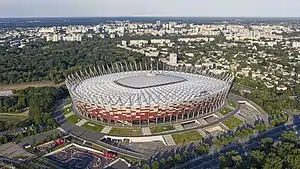

.jpg.webp)
.jpg.webp)
.JPG.webp)
